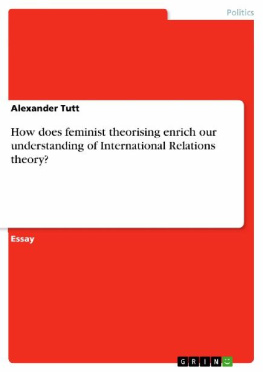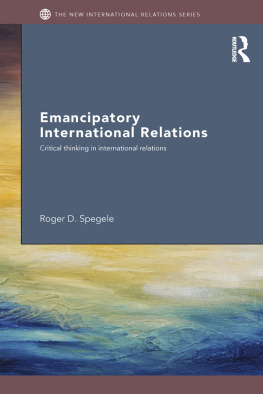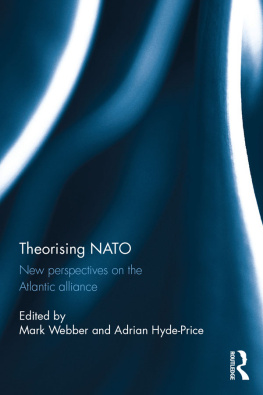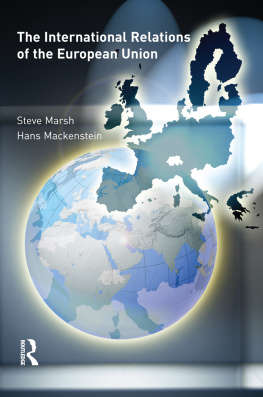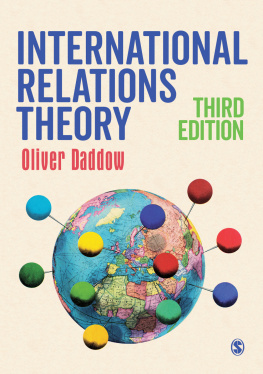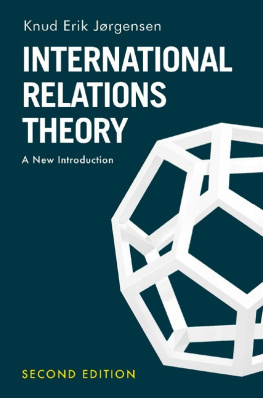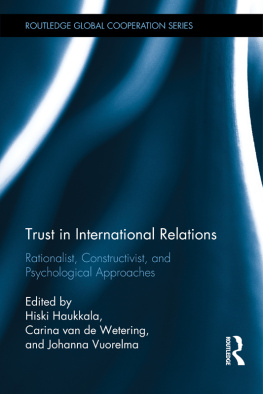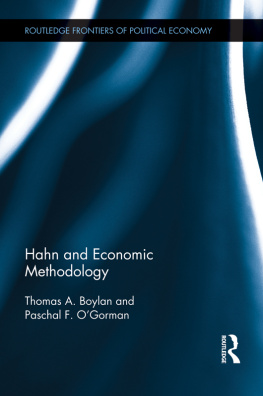






Politics
Alexander Tutt
How does feminist theorising enrich our
understanding of International Relations
theory?
Essay













Bibliographic information published by the German National Library: The German National Library lists this publication in the National Bibliography; detailed bibliographic data are available on the Internet at http://dnb.dnb.de .
This book is copyright material and must not be copied, reproduced, transferred, distributed, leased, licensed or publicly performed or used in any way except as specifically permitted in writing by the publishers, as allowed under the terms and conditions under which it was purchased or as strictly permitted by applicable copyright law. Any unauthorized distribution or use of this text may be a direct infringement of the author s and publisher s rights and those responsible may be liable in law accordingly.
Imprint:
Copyright 2012 GRIN Verlag
ISBN: 9783656683834
This book at GRIN:
https://www.grin.com/document/275405
Alexander Tutt
How does feminist theorising enrich our understanding of International Relations theory?
GRIN Verlag
GRIN - Your knowledge has value
Since its foundation in 1998, GRIN has specialized in publishing academic texts by students, college teachers and other academics as e-book and printed book. The website www.grin.com is an ideal platform for presenting term papers, final papers, scientific essays, dissertations and specialist books.
Visit us on the internet:
http://www.grin.com/
http://www.facebook.com/grincom
http://www.twitter.com/grin_com


Alexander D. Tutt!
IRT Seminar 5
International Relations Theory
Seminar 5
Date: Dec. 4th 2012
How does feminist theorising enrich our understanding of IR theory?
In IR theory as in everyday life, women seek to promote a better understanding of their struggle for recognition inside a male-dominated world. The orthodox field of IR theory is broadly faceted, generating space for numerous, more or less practicable approaches. In order to evaluate the impact of feminism on and inside IR theory, the structure of this essay is twofold. First of all, the genesis of feminist theorising has to be examined. Hence, historical, social and political features of the feminist movement are brought into context with the evolvement of several feminist IR theories.
Afterwards, a critical view on adequacy of IR feminism is taken, answering the question whether feminism achieved more than simply the addition of sex as a variable, as V. S. Peterson (1992, p.
199) provocatively put it.
Feminism as a scientific branch evolved out of the international movement for emancipation and equality of women during the 1960s and 1970s (Tickner, 2011, p.264). Until that point in contemporary history, feminist terms like woman, feminism and equality were broadly considered unproblematic (Peterson, 1992, p.191). After World War II, women were rather credited for their publishing of DIY-books on cookery1 than academic articles2; albeit even cookbooks mirror contemporary social, political and economic circumstances (Tutt, 2010, p.10).
However, as the political movement gained momentum, the feminist spirit entered the theoretical branches of social science in general, and IR theory in particular.
1 Among others, I especially allude to Marguerite Patten, who was appointed Commander of the Order of the British Empire in 2010, honoring her services to the Food Industry (London Gazette, 2010, p.8).
2 Interactively arranged data on scholarly publications on JSTOR is carried together by the Eigenfactor Project, led by Jevin West. Following this data set, female authors account only for 7,4% of published articles in the field of
International relations from 1665-1989 (West, J. et al., 2012).
Alexander D. Tutt!
IRT Seminar 5
First of all, two distinctions have to be made. On the one hand, a distinction between the terms
sex and gender, and on the other hand a disambiguation between feminism in political science, established in the 1970s, and feminism in IR, recognised in the late 1980s (Tickner, 1997, p.611).
Next page
